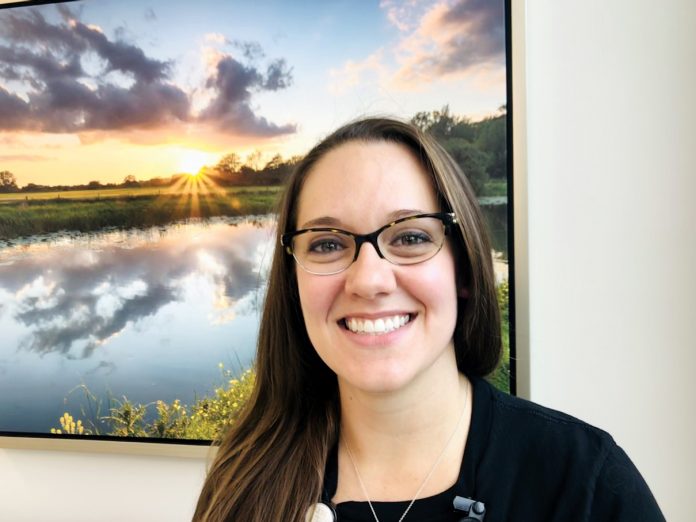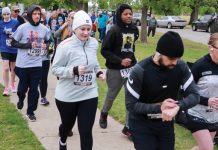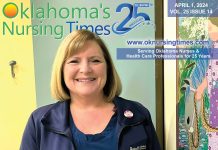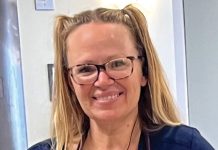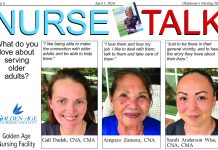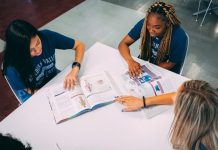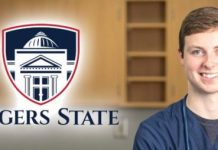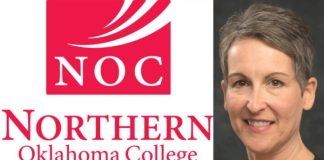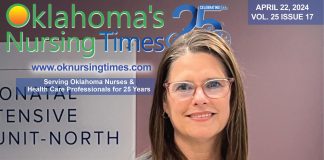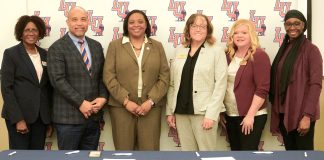by James Coburn – staff writer
A nursing career at Stillwater Medical Center has exceeded Trista Madison’s expectations. Madison is a cardiovascular nurse in the Heart and Vascular Institute. The mechanics of the heart that sparks her intellectual curiosity.
“The hospital here is so family oriented while it’s expanding and they do all these innovative new things,” she said. “It feels small enough that it’s very homey and comfortable. You know everybody here and it’s really amazing to grow with the hospital. I’m attracted to that. I love it here.” (story continues below)
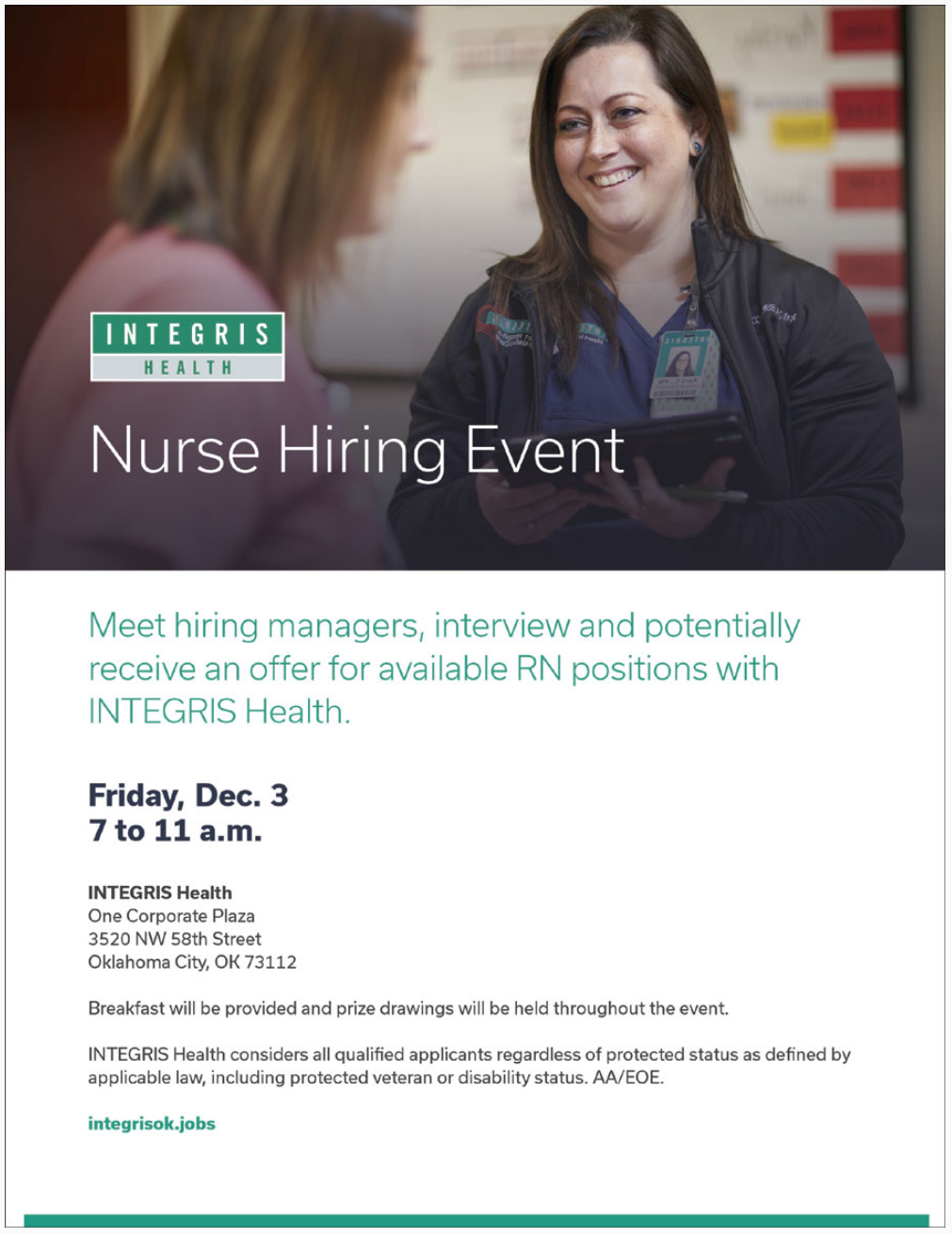
Meet hiring managers, interview and potentially receive an offer for available RN positions with INTEGRIS Health.
Friday, Dec. 3
7 to 11 a.m.
INTEGRIS Health
One Corporate Plaza
3520 NW 58th Street
Oklahoma City, OK 73112
Breakfast will be provided and prize drawings will be held throughout the event. INTEGRIS Health considers all qualified applicants regardless of protected status as defined by applicable law, including protected veteran or disability status. AA/EOE.
www.integrisok.jobs
INTEGRIS considers all qualified applicants regardless of protected status as defined by applicable law,
including protected veteran or disability status. AA/EOE.
Additionally, Madison wanted to alert women that their symptoms for a heart attack may differ from a man. Women typically are stoic with a high pain tolerance. So many women don’t complain, she said. During a heart attack many women feel chest pressure while not having chest pain.
“For a lot of them the first presentation is fatigue. They’re overly tired with nausea, whereas men have external, crushing chest pain,” she said.
Madison thrives on learning. Her education includes being certified in both cardiovascular and critical care nursing. She began her career with an Associate of Science degree in Nursing at Tulsa Community College in 2010. She earned her Bachelor of Science in Nursing at Southwestern Oklahoma State University (SWOSU) in Weatherford. And she recently earned her Master of Science degree in Nursing at SWOSU.
Including herself, most nurses enter the field because they want to help people, she said.
“My mom is a nurse and I remember she had overcome a lot of obstacles as I was growing up,” Madison said of her mom’s ER and wound care nursing. “She kind of had a rough go of things, and so I watched her go through nursing school when I was about six. And it was a lot of me and her time. I remember as a 6-year-old holding a lot of flash cards in the shower when she was getting ready and learning a lot of those big concepts that helped her through nursing school.”
At Stillwater Medical Center, Madison began as a medical surgical nurse for three years before serving in the ICU for seven years where she worked during the peak of the COVID pandemic. Madison moved to the catherization lab in April.
Her move to the catherization lab was motivated by the electrophysiology procedures the hospital had implemented. Ablation became a new practice there. Since February, the catherization lab is up to more than 30 ablation cases. In October they began doing cryoablations to restore normal heart rhythm by disabling heart cells that create an irregular heartbeat.
“That’s something that not many hospitals in general do, especially here in Oklahoma,” Madison explained. Scar tissue is created to maneuver the electrical pathway.
Her coworkers are prepared for a myriad of tasks, including an appropriate response to the COVID pandemic while enduring enormous challenges.
“I spent the peak of the pandemic in the ICU and watching the ICU nurses overcome so many awful things,” she said. “They really came together, and I feel like that is true in the Cath lab, too. There are so many obstacles that we must work together to get through. We had to be creative, and we had to work as a team together. I could not ask for a better group of people to do that with.”
Being a nurse has brought Madison to evolve and mature in life. Being a nurse is responding to the patient and the family within the organization you are working for, she said.
“I go back to the pandemic again because I feel it’s important. I think the pandemic has helped me specifically to realize that nurses need help also,” she said.
Madison said she is making sure that her co-workers and peers are well. She has done a lot of work in self-care while encouraging nurses to care for themselves.
Compassion comes from within, she said. Without refilling your compassion through self-care, you cannot give compassion, she explained.
Madison does yoga and works-out about six or seven days a week. She has two young daughters at home, seven and three.
“I spend a lot of time with them and get them involved in what I’m doing.”
Sometimes it’s hard to separate oneself from being a nurse, she said.
“Sometimes you just have to be a mom and a wife, a daughter and a sister, and kind of put nursing to the side a little bit,” Madison added.
Eight months of fertility treatments during the earlier days of her career caused her to temporarily leave the hospital to be closer to home. But she began to miss her work at the hospital. So, she returned.
“I’ve always been drawn to the heart,” she said. “It’s the heart of everything we do. It’s so essential for everything. If it’s not working appropriately, nothing else is going to work appropriately.
For more information on Stillwater Medical Center visit: https://www.stillwater-medical.org


